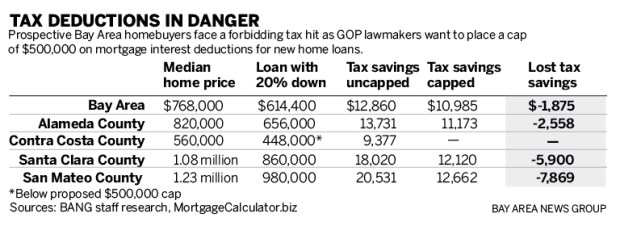In what will seem like manna from heaven for Bay Area homebuyers, the Senate version of the Republicans’ high-stakes tax overhaul is set to be unveiled today with one bit of very good news: the chamber’s version reportedly keeps the mortgage interest deduction limit at $1 million, as compared with the House legislation released last week which placed a cap of $500,000 for new home sales.
Yet while that pain has apparently been averted for anyone wanting to buy a home in the ultra-pricey San Francisco Bay, another element of the Senate plan will put salt in the regions’ wounds.
Rather, make that SALT, for “state and local tax deductions,” a wonderful tax break for residents in this expensive corner of the country that now is going bye-bye if the Senate plan goes through. That could hit Bay Area residents in both bad and not-so-bad ways.
Here are some of the highlights of the bill about to come out of the Senate Finance Committee as its counterpart in the House — the Ways and Means Committee — wraps up work on its version by Friday, according to sources who spoke with the AP.
- The decision to not lower the cap on deductible mortgage interest might not thrill large swaths of the country, but in the Bay Area, where the median price of a new home now stands at $752,000, the move will be most welcome;
- Note that this change would only apply to new mortgages, so Bay Area residents who are already homeowners have nothing to worry about; under the House plan, though, house-seekers would pay more to the tax man for a half-million-plus loan. The real-estate lobby has been fighting hard to stop it from happening;
- On Thursday, the California Building Industry Association released a statement asking that the $1-million cap not be messed with, saying “in states such as California where the median price of a home is $533,000, it is essential for homeowners to be able to deduct the full amount of the mortgage interest deduction. We are concerned that the limits to the deduction in the Act will create a depressive effect particularly in California which could lead to a nation-wide housing recession.”
- Again, keeping the limit in place is a big deal for Californians; the rest of the nation didn’t have as much to lose from a lowered cap since the median home price in the United States is about $200,000 and less than three percent of homeowners have more than $500,000 in debt, according to data from CoreLogic;
- As far as cutting SALT deductions, which are currently used by one in three Californians, the impact on Bay Area taxpayers is more nuanced: it will hurt the region’s residents, but perhaps not as badly as it’ll hurt residents on the East Coast who pay higher property taxes. The House bill retains deductions for property taxes; the Senate bill reportedly would eliminate them. One estimate says that the one-third of Californians who use the SALT deduction receive an average $18,000 each in benefits;
- As the LA Times pointed out, California’s “endangered GOP lawmakers have been remarkably muted about the pending assault on their constituents” from the House bill; meanwhile, East Coast moderates are negotiating a compromise that would simultaneously help their states and make California the biggest loser.
- “Under the compromise,” says the report on the House bill, “Americans will be able to deduct property taxes of up to $10,000, but not income taxes. That’s rough if your state happens to have the nation’s highest income tax and one of the country’s lowest property tax rates. That is, if your state is California.”
- The Senate bill is likely to include measures to drop the corporate rate to 20 percent (although it reportedly delays that cut until 2019) and give relief to more pass-through businesses; it could also compress the personal income tax brackets from seven to four;
- Taken together, the two versions, however they end up, constitute the first major overhaul of the American tax code in three decades;
- On Thursday morning, CBS South Dakota Republican Sen. John Thune told “CBS This Morning” that portions of their bill will “largely follow the House’s action.”
- “The details are in some cases slightly different than what House did, we took a slightly different approach on some of the major issues but the contours of bill will largely follow the House’s action,” said Thune.
- Finally, the Senator defended the idea of doing away with deductions for state and local taxes, which would disproportionately impact residents of high-tax states like New York, New Jersey and California. “In terms of that deduction, it’s been around for a while but it also is one that we think subsidizes states that have higher taxes, and by eliminating that deduction it will force states to look at their budgets,” said Thune, adding that it’s a part of the tax code that “needs to go away.”
Here is a look at the potential impact of the House plan to cap the mortgage interest deduction. The Senate plan reportedly retains the tax break.

Article source: http://www.mercurynews.com/2017/11/09/what-the-senates-tax-bill-means-for-the-bay-area/
